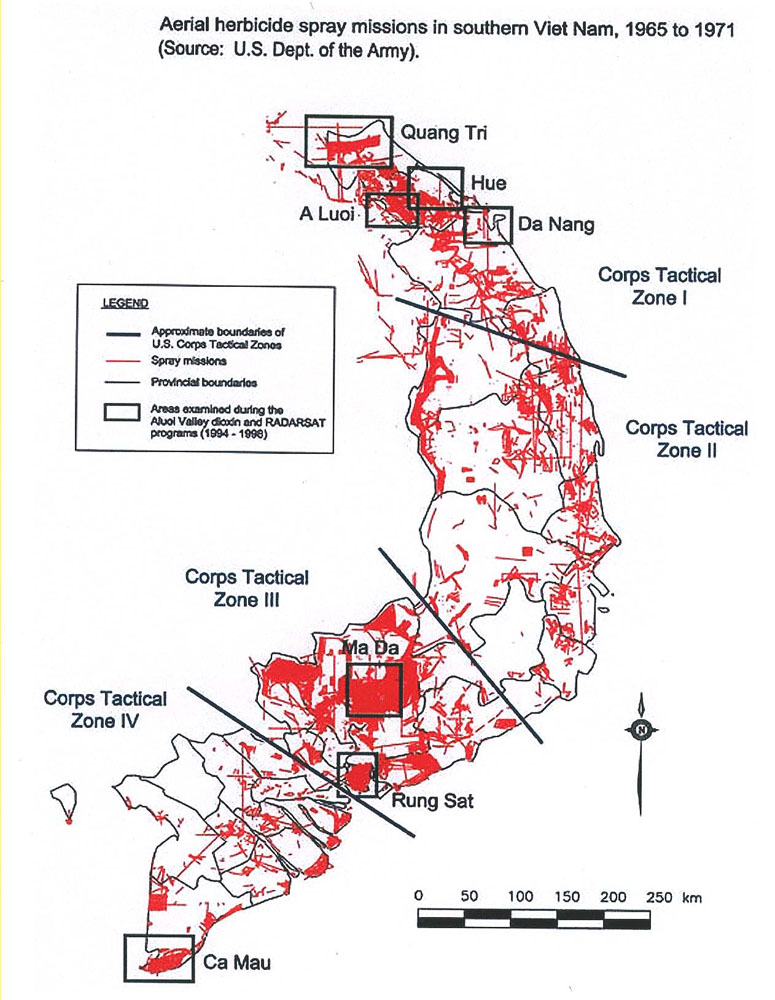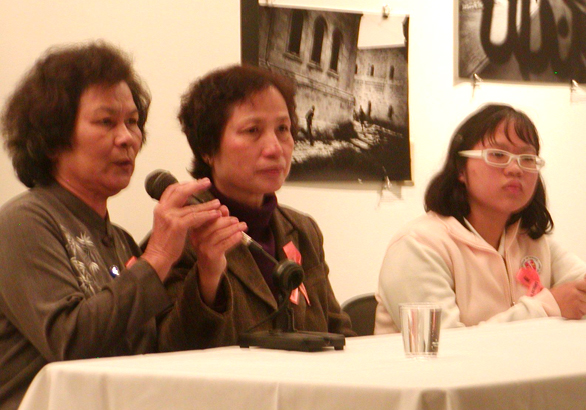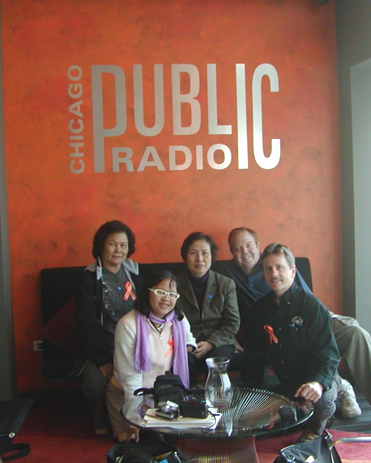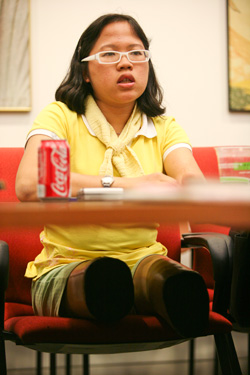Tuesday, March 29, 2016
Thursday, February 11, 2010
Monday, December 21, 2009
Another Sorry Episode in American History: Agent Orange
This recent article by Time Magazine on Agent Orange in Vietnam opened up a floodgate of emotions I had thought I had gotten over with a year ago, after my own personal first-hand experiences there. The article was fairly well-written, that is, considering the publication. Here are some excerpts:
This lonely section of the abandoned Danang air base was once crawling with U.S. airmen and machines. It was here where giant orange drums were stored and the herbicides they contained were mixed and loaded onto waiting planes. Whatever sloshed out soaked into the soil and eventually seeped into the water supply. Thirty years later, the rare visitor to the former U.S. air base is provided with rubber boots and protective clothing. Residue from Agent Orange, which was sprayed to deny enemy troops jungle cover, remains so toxic that this patch of land is considered one of the most contaminated pieces of real estate in the country. A recent study indicates that even three decades after the war ended, the cancer-causing dioxins are at levels 300 to 400 times higher than what is deemed to be safe.
After years of meetings, signings and photo ops, the U.S. held another ceremony in Vietnam on Dec. 16 to sign yet another memorandum of understanding as part of the continuing effort to manage Agent Orange’s dark legacy. Yet there are grumblings that little — if anything — has been done to clean up the most contaminated sites. Since 2007, Congress has allocated a total of $6 million to help address Agent Orange issues in Vietnam. Not only does the amount not begin to scratch the surface of the problem or get rid of the tons of toxic soil around the nation, but there are questions about how the money is being spent.
Groups caring for children born with horrific deformities from Agent Orange — such as malformed limbs and no eyes — are wondering why they haven’t seen any of that money. Bedridden and unable to feed themselves, many patients need round-the-clock care. As they age, and parents die, who is going to look after them? asks Nguyen Thi Hien, director of the Danang Association of Victims of Agent Orange.
You can read the entire article here.
I spent the better part of the year 2008 in Vietnam. I traveled around the country, and was involved in interviewing and recording various children related charities and organizations there. While in the Da Nang area I had an opportunity to visit and interview a family who were victims of Agent Orange – bed-ridden twin men of age 28 and their parents.
The family lived in a village, in a shack, 3.5 miles from the nearest road. I had to walk the entire distance on a very hot and humid day, pass through many rice paddies, and after being chased by an angry water buffalo, I finally made it.
The following 5-minute video includes one of the interview segments I conducted with the parents, and brief footage of the twin’s horrendous condition. Before you watch the video:
- The footage of the Agent Orange victims is very graphic and may be disturbing to some.
- I apologize for the quality of the video: I had to conduct the interview through my translator and overcome my own shock and emotional response, while recording the victims.
Here is my video, recorded in March 2008, near Da Nang, Vietnam:
I want to emphasize these facts from the Time Magazine article:
The U.S. government still spends billions every year on disability payments to those who served in Vietnam — including their children, many of whom are suffering from dioxin-associated cancers and birth defects. Since 2007, Congress has allocated a total of $6 million to help address Agent Orange issues in Vietnam.
And,
Some point out that the U.S. spends only a fraction on Agent Orange cleanup compared to the $50 million it spends every year on searching for the remains of American soldiers missing in action.
And I want to add a few other comparison points:
We spend billions per week on undeclared wars to injure, kill, and destroy. We spend hundreds of millions of dollars on fraudulent and wasteful defense contracts. We spend billions on drones and bombs which kill 687 civilians per 14 enemy targets, amounting to a ratio of nearly 50 civilians killed for each undeclared enemy killed…
And when it comes to cleaning up this huge mess we left behind in Vietnam, when it comes to a certain degree of reparation expected from a superpower nation with even a minute amount of moral decency, when it comes to…we go on denying responsibility, arguing irrational technicalities, and do nothing, absolute zilch.
President Gerald Ford had the following to say on February 19, 1976, on the anniversary of the Japanese Internment:
I call upon the American people to affirm with me the unhyphenated American promise that we have learned from the tragedy of that long ago experience-forever to treasure liberty and justice for each individual American and resolve that this kind of error shall never be made again.
Okay, for this post I am not going to dwell upon President Ford’s consciously chosen words to emphasize our responsibility to treasure liberty and justice only for individual Americans, and not for all humanity (Still- I’m grinding my teeth, and holding my tongue). Now, here is my question:
What is it with all these past lessons of tragedies we later come to admit to and regret?! Because we keep doing the same thing over and over again. Because we seem to always turn around afterwards and start the next vicious cycle again. And it seems we have been making the vicious cycles longer and crueler each time: Abu Ghraib, Guantanamo, Bagram, Extraordinary Renditions …
Perhaps a president or two later, we’ll be hearing regrets along the same lines on all the atrocious acts we’ve been engaged in since 2001, in the name of a war on terror, in the name of national security. Perhaps, we’ll be taking a solemn oath or two to not repeat the same atrocious acts. Perhaps we’ll have a law or two written to emphasize and engrave our regrets and commitment to never do the same again… And then, perhaps, there will come another pretext, or something declared and used as pretext, and we’ll go about forgetting all past regrets, declare our previous oaths nullified, and have the previous laws replaced with the opposite of the original and name them ‘patriotic,’ and …there we’ll go repeating history, only making each cycle bigger and worse than the one before.
Am I just being cynical here? I don’t think so. But, what do you think?
Tuesday, May 26, 2009
The Legacy of Agent Orange is a Continuing Focus of VVAW
By Paul Cox
 |
By the time you read this, the fourth Vietnamese delegation of Agent Orange victims co-sponsored by VVAW will have finished their 10-city tour, including a stop in Chicago where they were hosted by VVAW. Public events were held at the Gage Gallery in Roosevelt University and at the Jane Hull House, and they were interviewed on NPR's World View program. Bob Gronko did a great job organizing their stay in Chicago, and VVAW made a generous donation to support the tour.
VVAW has a long history of fighting for justice for victims of Agent Orange poisoning; VVAW was a loud and clear voice exposing AO and calling for help and compensation for veterans suffering the ill effects of AO/dioxin since 1978. In recent years, VVAW has strongly supported the Vietnamese people in their efforts to achieve recognition and for relief from the massive damage AO/dioxin has done to their environment and their people.
VVAW has hosted in Chicago Agent Orange victims delegations in 2005, 2007, and October 2008 (the other delegation went only to DC). The delegations are from the Vietnam Association of Victims of Agent Orange/dioxin (VAVA), which is the membership organization in Vietnam fighting for justice for the Vietnamese. Dave Cline and Bill Davis—both of whom we lost last year—and many others in VVAW have worked hard on the AO issue, which continues to develop as more information becomes available about its effects. But much more work is needed.
As reported in the last issue of The Veteran, the US Court of Appeals failed in its duty to reinstate the VAVA lawsuit against the chemical companies that was dismissed by Jack Weinstein. On October 6, attorneys for VAVA filed a writ of certiorari with the Supreme Court asking them to hear the case for reinstatement. This court, though, is not likely to accept the case, but the Vietnamese want to exhaust all remedies. Whether or not the case dies at the steps of the Supreme Court, the struggle will continue.
As you may know the Vietnam Agent Orange Relief and Responsibility Campaign (VAORRC) is one of the organizations in the US that is working to support VAVA. Dave Cline and Bill Davis were on the national board and national coordinators of VAORRC, as are VVAW members Barry Romo and Paul Cox. At the steps of the Supreme Court, VAORRC launched the international corporate campaign against Dow and Monsanto: "Do the right thing – compensate Vietnam's Agent Orange victims!" Next year VAORRC will mount a legislative campaign to convince Congress to step up to our responsibilities and provide—if for no other reason—real funds for humanitarian assistance to the Vietnamese victims of AO. The legislation has not yet been written, but a number of influential congress members and senators have expressed firm support for such a bill. When the bill is submitted, it should have provisions for a number of distinct projects:
• Environmental clean-up of the forty identified hotspots.
• Stationary or mobile clinics for pre-natal testing of pregnant women who may have been exposed to AO.
• Testing programs for populations living near hot spots for dioxin in their bodies.
• Genetic and epidemiological research into the multi-generational effects of dioxin exposure.
• Reconstructive surgery for the many children with deformities whose lives could be improved by it.
• Prostheses, wheelchairs, accessibility modifications to habitat, and independent living training for those whose can benefit from such aid.
• Medical treatment for those sick from AO.
• Long-term supportive care for those who are disabled from exposures or birth defects.
• Financial assistance to those families driven into poverty due to disabilities or birth defects of family members.
Getting comprehensive well-funded legislation through Congress will take a major advocacy effort. If it is to be successful, it will require some effort from every VVAW member and supporter, and every person in this country who thinks our nation needs to step up to its responsibilities. Once the legislation is introduced, we will all have to contact our representatives and urge them to support it. Actually, in some cases, we will have to not only urge it; we will have to require it, insist upon it, demand it, and shout it. It will be a fight worthy of VVAW!
Paul Cox served as a Marine in Vietnam from 1969 to 1970 and is a member of VVAW.
He is on the national board of the Vietnam Agent Orange Relief and Responsibility Campaign.
 |
| Mrs. Dang Hong Nhut, translator Ms.Dinh Thi Minh Huyen and Ms. Tran Thi Hoan at Agent Orange victims tour in Chicago, October 2008 |
 |
| (l-r) Mrs. Dang Hong Nhut, Ms. Tran Thi Hoan, translator Ms. Dinh Thi Minh Huyen, Steve Nelson and Bob Gronko at WBEZ, Chicago Public Radio, October 2008 |
 |
| Ms. Tran Thi Hoan |
Saturday, June 02, 2007
Vietnam - the American Holocaust
http://www.youtube.com/watch?v=DggnarSzFiY&mode=related&search=
part 2/2
http://www.youtube.com/watch?v=s38dbX9ttLg&mode=related&search=
part 3/3
http://www.youtube.com/watch?v=AbZkMxRKirE&mode=related&search=
Children: victims of Agent Orange
http://www.youtube.com/watch?v=bSevYf4ZIcQ&mode=related&search=
American Nazis in Vietnam
http://www.youtube.com/watch?v=k-C-8aGyDP4
A short clip from the video - Vietnam: American Holocaust
http://www.youtube.com/watch?v=xCgZLwAzr28&mode=related&search=
